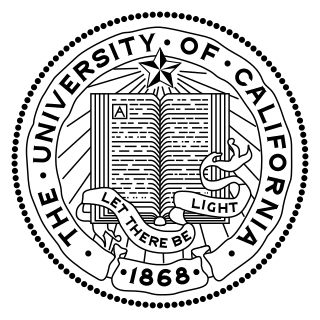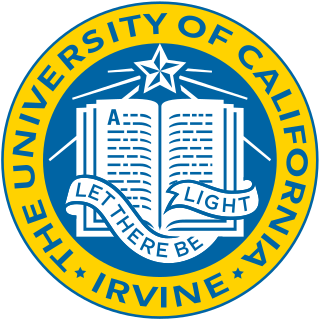Related Research Articles

The University of California, San Francisco (UCSF), is a public land-grant research university in San Francisco, California, United States. It is part of the University of California system and is dedicated entirely to health science and life science. It conducts research and teaching in medical and biological sciences.

The University of California (UC) is a public land-grant research university system in the U.S. state of California. Headquartered in Oakland, the system is composed of its ten campuses at Berkeley, Davis, Irvine, Los Angeles, Merced, Riverside, San Diego, San Francisco, Santa Barbara, and Santa Cruz, along with numerous research centers and academic centers abroad. The system is the state's land-grant university.

The University of California, Davis is a public land-grant research university in Davis, California, United States. It is the northernmost of the ten campuses of the University of California system. The institution was first founded as an agricultural branch of the system in 1905, known as the University Farm, and became the sixth campus of the University of California in 1959.

The University of California, Irvine is a public land-grant research university in Irvine, California, United States. One of the ten campuses of the University of California system, UCI offers 87 undergraduate degrees and 129 graduate and professional degrees, and roughly 30,000 undergraduates and 7,000 graduate students were enrolled at UCI as of Fall 2024. The university is classified among "R1: Doctoral Universities – Very high research activity" and had $534.9 million in research and development expenditures in 2022. UCI became a member of the Association of American Universities in 1996.

The University of California, Riverside is a public land-grant research university in Riverside, California, United States. It is one of the ten campuses of the University of California system. The main campus sits on 1,900 acres (769 ha) in a suburban district of Riverside with a branch campus of 20 acres (8 ha) in Palm Desert. In 1907, the predecessor to UCR was founded as the UC Citrus Experiment Station, Riverside which pioneered research in biological pest control and the use of growth regulators.
The College of Agricultural and Environmental Sciences (Ag&E) is one of four colleges of the University of California, Davis. Established in 1922, it offers degrees in 27 undergraduate majors and thirty-three graduate groups. As of January 2014, the College has been overseen by Dean Helene Dillard.
Elliot Meyerowitz is an American biologist.

Steven Dale Tanksley is the Chief Technology Officer of Nature Source Improved Plants. Prior to founding Nature Source Improved Plants, Tanksley served as the Liberty Hyde Bailey professor of plant breeding and biometry and chair of the Genomics Initiative Task Force at Cornell University College of Agriculture and Life Sciences. He is currently a Professor Emeritus at Cornell University.
The University of California Citrus Experiment Station is the founding unit of the University of California, Riverside campus in Riverside, California, United States. The station contributed greatly to the cultivation of the orange and the overall agriculture industry in California. Established February 14, 1907, the station celebrated its 100th anniversary in 2007.

Joachim Wilhelm "Jo" Messing was a German-American biologist who was a professor of molecular biology and the fourth director of the Waksman Institute of Microbiology at Rutgers University.
Gurdev Singh Khush is an Agronomist and Geneticist who, along with mentor Henry Beachell, received the 1996 World Food Prize for his achievements in enlarging and improving the global supply of rice during a time of exponential population growth.

Pamela Christine Ronald is an American plant pathologist and geneticist. She is a professor in the Department of Plant Pathology and conducts research at the Genome Center at the University of California, Davis and a member of the Innovative Genomics Institute at the University of California, Berkeley. She also serves as Director of Grass Genetics at the Joint BioEnergy Institute in Emeryville, California. In 2018 she served as a visiting professor at Stanford University in the Center on Food Security and the Environment.
The Biffen Lecture is a lectureship organised by the John Innes Centre, named after Rowland Biffen.
Jorge Dubcovsky is a plant geneticist and biologist at the University of California, Davis. He is an investigator with the Howard Hughes Medical Institute. Dubcovsky's research focuses on wheat genomics. In 2013, he was elected to the National Academy of Sciences. In 2014, Dubcovsky won the Wolf Prize in Agriculture alongside Leif Andersson.
Harris A. Lewin, an American biologist, is a professor of evolution and ecology and Robert and Rosabel Osborne Endowed Chair at the University of California, Davis. He is a member of the National Academy of Sciences. In 2011, Lewin won the Wolf Prize in Agriculture for his research into cattle genomics. Lewin chairs the working group for the Earth BioGenome Project, a moonshot for biology that aims to sequence, catalog, and characterize the genomes of all of Earth’s eukaryotic biodiversity over a period of 10 years. Lewin is a founding co-editor of the Annual Review of Animal Biosciences, first published in 2013.
Neelamraju Ganga Prasada Rao was an Indian geneticist and plant breeder, known for his efforts in developing hybrid varieties of sorghum, which earned him the moniker, the Father of Hybrid Sorghum. He was the vice chancellor of Vasantrao Naik Marathwada Agricultural University and chaired the Agricultural Scientists Recruitment Board of the Indian Council of Agricultural Research. He was a recipient of several national honors including Rafi Ahmed Kidwai Award and the VASVIK Industrial Research Award. The Council of Scientific and Industrial Research, the apex agency of the Government of India for scientific research, awarded him the Shanti Swarup Bhatnagar Prize for Science and Technology, one of the highest Indian science awards, in 1966, for his contributions to biological sciences.
Bhyravabhotla Radhakrishna Murty (1928–2003) was an Indian botanist, known for his contributions the fields of Conservation genetics and Radiation genetics. He was a professor of Biochemistry Division at Indian Agricultural Research Institute, Pusa and was an elected fellow of Indian Academy of Sciences and the Indian National Science Academy. The Council of Scientific and Industrial Research, the apex agency of the Government of India for scientific research, awarded him the Shanti Swarup Bhatnagar Prize for Science and Technology, one of the highest Indian science awards, in 1973, for his contributions to biological sciences.
Tilak Raj Sharma is an Indian plant biologist, the deputy director general (CS) of ICAR and former executive director and chief executive officer of the National Agri-Food Biotechnology Institute (NABI), and Center of Innovative and Applied Bioprocessing (CIAB) respectively, both autonomous institutes under the Department of Biotechnology. Known for his studies in the fields of genomics and plant disease resistance, Sharma is an elected fellow of the National Academy of Sciences, India, the National Academy of Agricultural Sciences and the Indian National Science Academy. The Department of Biotechnology of the Government of India awarded him the National Bioscience Award for Career Development, one of the highest Indian science awards, for his contributions to biosciences in 2007.

Raymond L. Rodriguez is an American professor of biology, specializing in molecular biology, genomics and biotechnology. His current research interests include diet-genome interactions, plant-made pharmaceuticals and the food/brain axis. Rodriguez is also an inventor, and entrepreneur. His research at the University of California, San Francisco in the 1970s helped lay the foundation for the biotechnology industry. He also holds several issued US patents. He is involved in programs that promote diversity, equity and inclusion for women and underrepresented minorities in science, technology, engineering, and mathematics (STEM) disciplines.
References
- ↑ "Venkatesan Sundaresan". UC Davis College of Biological Sciences. The Regents of the University of California, Davis campus. 14 February 2018. Retrieved 27 December 2024.
- ↑ Milius, Susan (12 December 2018). "Hybrid rice engineered with CRISPR can clone its seeds". ScienceNews. Society for Science & the Public. Retrieved 27 December 2024.
- ↑ Wait, Liana (17 July 2024). "Plant Biologist Venkatesan Sundaresan Wins 2024 Wolf Prize in Agriculture". UC Davis. The Regents of the University of California, Davis campus. Retrieved 27 December 2024.
- ↑ "Venkatesan Sundaresan". National Academy of Sciences. Retrieved 27 December 2024.
- ↑ "Venkatesan Sundaresan". Wolf Foundation. 3 July 2024. Retrieved 27 December 2024.